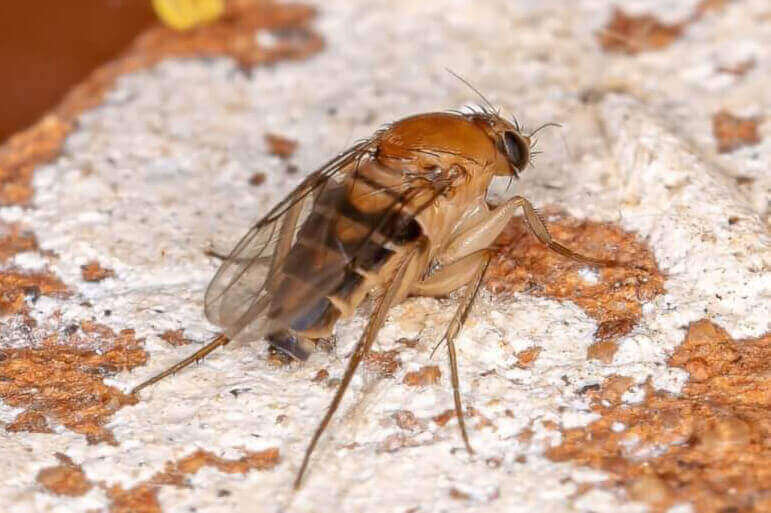Phorid Fly Facts & Information
Everything you need to know about phorid flies
what do Phorid Flies look like

To the naked eye, phorid flies resemble the common fruit fly, but when you look closer, you will see an arched thorax that gives them a humpbacked appearance. That hump can get them confused with mosquitoes. Most are black or dull brown, but some are yellowish in color. The phorids are a large family of small flies (0.4 – 6 mm) with more than 3500 species worldwide. Other common names for flies in this family include humpbacked, coffin, and scuttle flies. As a group, they have a wide diversity of shape and form, and their larvae gain sustenance from a variety of sources. The smallest fly in the world, the phorid fly is originally from Thailand. This species attacks acrobat ants – developing within the ants’ heads. Other phorid species are known to attack the imported red fire ant, various wasps, bumble bees, and even the beloved honeybee.
Most of the species deposit their eggs in decaying animal or plant material and it is in these instances that they come into conflict with us. Two of the species most frequently found in homes are a humpbacked fly and the scuttle fly. These pests display characteristically short and erratic flight. Adults have a peculiar habit of rapidly running across windows, TV screens, tables, walls, and plant foliage. They are also frequently mistaken for gnats. Phorid fly treatments and control – or any fly – really depends on sanitation fixes and removing attractants. Don’t let a fly exterminator tell you they can handle them without that.Not the fly you have?
Most of the species deposit their eggs in decaying animal or plant material and it is in these instances that they come into conflict with us. Two of the species most frequently found in homes are a humpbacked fly and the scuttle fly. These pests display characteristically short and erratic flight. Adults have a peculiar habit of rapidly running across windows, TV screens, tables, walls, and plant foliage. They are also frequently mistaken for gnats. Phorid fly treatments and control – or any fly – really depends on sanitation fixes and removing attractants. Don’t let a fly exterminator tell you they can handle them without that.Not the fly you have?
How Did I Get Phorid Flies
Decaying plants and animals attract phorid humpbacked flies. However, unlike the common fruit fly, these insects are more apt to spread throughout a home rather than staying near their food source. Its common name is derived from that behavior and can be helpful in identification for the layperson. Phorid flies are found feeding in many types of substances. Decaying plants and animals attract phorid humpbacked flies. However, unlike the common fruit fly, these insects are more apt to spread throughout a home rather than staying near their food source. Search your home for rotting bags of potatoes, onions, or other stored tubers. When no apparent food source can be located it could be a broken septic line or cracked septic tank. Consult with a reputable plumbing firm that can provide examination of the lines using a flexible scope and/or injection of smoke to determine if the lines are fractured.
Scoping doesn’t always reveal cracks but smoke will follow the path used by adult flies when entering buildings. Commonly, smoke will escape along foundation expansion cracks or similar openings. Phorid flies will breed within dead animals and cadavers so if you have a dead animal in the walls, the attic, or under your home, it could be attracting these flies. The scuttle fly has a propensity to run erratically across surfaces rather than fly. Its common name is derived from that behavior and can be helpful in identification for the layperson. These nasty flies can also be seen flying about mausoleums or in churches that have crypts. No matter where you see them, call in a professional fly treatment company.
Scoping doesn’t always reveal cracks but smoke will follow the path used by adult flies when entering buildings. Commonly, smoke will escape along foundation expansion cracks or similar openings. Phorid flies will breed within dead animals and cadavers so if you have a dead animal in the walls, the attic, or under your home, it could be attracting these flies. The scuttle fly has a propensity to run erratically across surfaces rather than fly. Its common name is derived from that behavior and can be helpful in identification for the layperson. These nasty flies can also be seen flying about mausoleums or in churches that have crypts. No matter where you see them, call in a professional fly treatment company.
What Problems Do Phorid Flies Cause
Since phorid flies feed on rotting food, they also area able to spread bacteria and disease. Phorid flies also live in and around septic tanks and rotting material, allowing their bodies to pick up even more harmful bacteria. As they land on their preferred food source, they pick up germs and then transfer them to wherever they land. When a phorid fly lands on food, eating utensils, or meal prep areas, they can transmit these pathogens to any surface they touch. In addition, a phorid fly infestation may mean you have a dead animal inside the wall or crawl space or a plumbing leak somewhere. Knowing these tips and expert strategies will be the phorid fly treatment methods you will want to employ.
How Can I Prevent Phorid Flies
Removing the breeding sites that phorids look for is the fastest method of controlling phorid flies. Throw spoiled leftovers away and always keep trashcans sealed. Wipe down counters, clean under appliances, and use floor cleaners regularly to prevent food crumbs from accumulating in kitchens. Always look through your foods and immediately dispose of rotting potatoes, onions, etc. You can keep those foods in the refrigerator to mask the smell from the flies. These types of good sanitation practices will help with all flies and even some other pests that are attracted to garbage and rotting foods.
Why Waltham for Phorid Fly Control
We’re passionate about keeping flies out of your home or business because we live and work here – it’s our neighborhood, too. With our 1300 years of experience keeping homes and businesses in Massachusetts, Connecticut, New York, Maine, Vermont, New Hampshire, and Rhode Island safe from pests, Waltham has the experience you can trust.
Satisfaction Guarantee
24-Hour Guaranteed Response
Board Certified Entomologists
Need help with phorid flies?
GET MY QUOTE
“Exceptional service. Prompt and professional. Used for both business and home. Very efficient and honest.”
Agawan, MA
